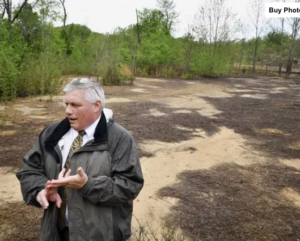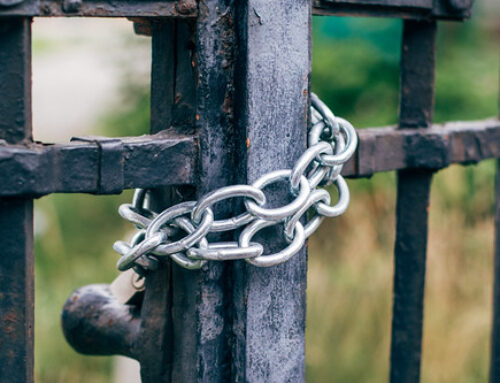TDEC clamps down on public records as tons of radioactive waste heads to Tennessee
The state has stopped allowing citizens access to how much low-level radioactive waste is going into landfills, according to a report by Nashville investigative journalist Anita Wadhwani in The Tennessean.
Wadhwani reports that this clamp down on data by the Tennessee Department of Environment and Conservation comes at the same time that waste processing companies in Tennessee “have filed notice that they plan to import 10,000 metric tons — or more than 22 million pounds – of low-level nuclear waste from Canada for processing.”
It is not clear where that waste would go after processing. The newspaper reported that four Tennessee landfills are currently licensed to accept that type of waste — two in Shelby County and others in Anderson and Hawkins counties.
But in a package of stories that focuses on the shrouded nature of TDEC’s actions, Wadhwani reports how at least two Tennessee communities who are fighting with landfill operators about toxic contamination are also complaining about lack of notice and public input into permit expansions that they believe put their land and residents at environmental and health risk.
A key complaint from residents and town leaders in Camden and Decatur County is that they were unaware that TDEC was expanding permits of landfill operators to accept thousands of tons of industrial “special waste.” By definition, that means the waste is difficult or dangerous to manage.

Decatur County Mayor Mike Creasy stands in an area where runoff from the landfill has caused vegetation to be killed and polluted a creek nearby. He is afraid it will leach into nearby wells and affect the local drinking water. Wednesday April 19, 2017, in Decaturville, TN . Photo by Larry McCormack / The Tennessean
“I think the community here was left in the dark,” Decatur County Mayor Mike Creasy told The Tennessean (Tennessee towns fight landfills). “I’ve been in the timber industry all my life and I never knew anything about aluminum dross or any of the other things going on in here. We put our trust in TDEC. We put our trust in the company.”
A lack of notification about landfill permit expansions in not new. Residents around Middle Point landfill in Murfreesboro were outraged to learn in 2007 their landfill — with no public notice or input — was accepting low-level radioactive waste. They launched a campaign that caused the landfill to cease accepting such waste in 2008.
The new veil of secrecy by TDEC around low-level radioactive waste going into Tennessee landfills is based on a Tennessee Public Records Act exemption passed by lawmakers around the same time as the Murfreesboro controversy in 2007, §T.C.A. 11-1-102(c)(1). But it had not been used until recently.
According to The Tennessean’s reporting (Tennessee officials keep radioactive waste details from public), the state environmental agency until recently published that information on its website. According to cached versions of TDEC’s website accessed by The Tennessean, more than 5.3 million pounds had been released into Tennessee landfills between 2014 and 2016.
Furthermore, audio from the legislative hearing in 2007 has a TDEC attorney specifically telling lawmakers who were considering the exemption that it would not apply to keeping information on low-level radioactive waste secret.
The exemption defines as confidential “radioactive materials regulated by the United States nuclear regulatory commission or by a state under an agreement with the nuclear regulatory commission pursuant to ง 274(b) of the Atomic Energy Act, codified in 42 U.S.C. ง 2021(b)…”
The Tennessean contacted a Nuclear Regulatory Commission spokesman to ask if such information was confidential, and he said he knew of no law or rule that would make the location or quantity of waste confidential. Also, such information is public at federal landfills.
Meanwhile, the series of stories by The Tennessean raise serious questions about the ability of local communities to know or have input into what is going into local landfills.
Decatur County’s landfill — which is owned by the county – was originally permitted to accept household waste, but that changed in the decade after the county contracted with a private company to manage the site and the private company began getting approval from the state to accept other types of waste.
Likewise, in Camden, according to the newspaper’s reporting, a private company who operates a landfill there has been able to privately petition — without public notice — the state environmental agency for approval to take in special waste “from aluminum, coal and railroad industries, along with diesel fuel from a Superfund site.” (Hazardous landfill, state inaction a toxic mix for Tennessee town)
Not only does this process exclude the public, but The Tennessean reports that TDEC officials are in the process of speeding up such approvals through a streamlining process, making it even easier (and, in my opinion, harder for communities to find out and try to intervene in time): From the story:
Obtaining a state permit to establish a new landfill requires public notice and disclosure about the types of waste that will be deposited so communities can discuss, debate or even intervene to stop a landfill before it starts. Once a landfill has gotten its initial permit, however, landfill owners and waste generators in Tennessee can privately petition the state to accept additional and potentially hazardous materials.
Last year, TDEC approved 950 new and renewal requests for special waste to be dumped at landfills across the state. Once a request is granted, tons of an approved waste can be dumped at a site regularly. Altogether, there are 138 landfills and 87 solid waste processing facilities in Tennessee. TDEC officials this year are in the process of streamlining the special waste process to speed up approvals.
Environmentalists and city residents say Camden is a prime example of what can go wrong when TDEC approves special wastes without community input or notice.
TDEC in April designated the landfill as a “large quantity generator of hazardous waste,” according to an August TDEC letter sent to Environmental Waste Solutions. Routine tests of the landfill found that special waste deposited at the site had reacted to create a toxic stream that met federal hazardous waste standards.
Camden Mayor Roger Pafford said no one from TDEC informed city officials that their town was now home to a hazardous waste landfill. The omission was particularly galling to city officials because the leachate – or wastewater – pipe carrying hazardous waste from the landfill flows directly above a city drinking water main.
It should be noted that a TDEC spokesman, on the eve of The Tennessean publishing its stories, told the newspaper that that it is “working toward a solution” and it intends “to have the authority to soon begin providing that information (about low-level radioactive waste) again.”

